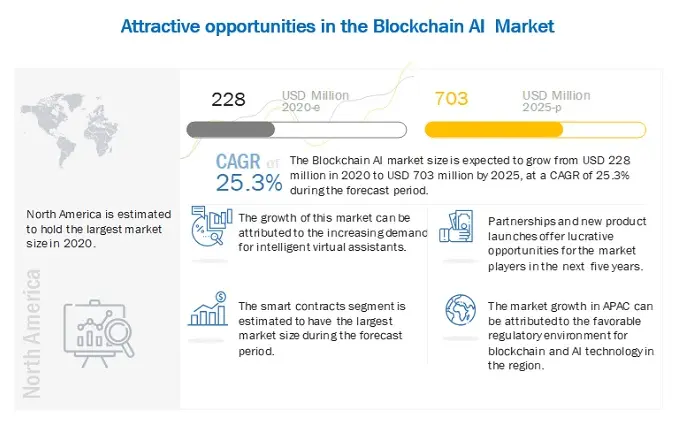The paradigm-shifting technologies of AI and blockchain evolve at an unprecedented pace. Each technology innovates how we organize data and optimize systems. Together, their synergy unlocks new possibilities by enhancing security, transparency, trust, and productivity.
As both fields surge toward mainstream adoption, integration becomes crucial for unlocking their full potential. However, coupling these advanced technologies requires navigating technical complexities. Standards must evolve to improve interoperability, trust, and responsible oversight over long product lifecycles.
This post explores how effectively blending AI and blockchain can future-proof emerging technologies. We analyze their core principles and examine integration opportunities across various sectors. We focus on pioneering solutions that contribute to responsible development. Our aim is to equip decision-makers with foresight to harness innovation wisely.
Table of Contents
Statistics About AI with Blockchain
Before delving into conceptual details, let’s gain context with key statistics on AI-blockchain convergence :
- The AI-blockchain market is projected to reach $27 billion by 2027 at 60% CAGR according to Markets and Markets. Demand hinges on use cases of blockchain for AI requiring distributed trust and real-time analytics.
- The global market for AI in blockchain is projected to grow significantly, reaching USD 3718.34 million by 2033, reflecting a compound annual growth rate (CAGR) of 34% from 2024 to 2033 .
- Over 51% of organizations are expected to adopt AI with blockchain integration by the end of this year.
- A study indicates that 80% of companies plan to implement intelligent automation solutions involving AI and blockchain by 2025 6.
- Over 85% of tech leaders believe AI and blockchain have significant synergy, finding decentralized AI advantageous. Their 2021 IBM survey identified advanced data analytics, machine learning and increased trust as top benefits.
- NFT markets rely extensively on AI for computer vision, generative art and text generation. Anthropic reports AI wrote 10,000+ NFT project smart contracts in 2021 alone.
- Surveyed enterprises are rapidly adopting AI-enhanced blockchains like Hedera for healthcare, manufacturing and logistics use cases of blockchain for AI through 2024 according to ClearBridge.

This overview establishes blockchain and AI as complementary technologies where the market potential is immense given their growing adoption rates individually and together. Let’s now explore the core applications arising from their convergence.
Use Cases of Blockchain for AI
The use cases of blockchain for AI are vast and varied, demonstrating how these technologies can work together. From enhancing data privacy in AI applications to optimizing supply chain, the integration of blockchain provides a secure foundation. Below are some notable use cases that highlight the synergy between these two transformative technologies.
Enhancing Data Privacy in AI Applications
Power Of Data And AI privacy is a paramount concern in the age of digital transformation. The integration of blockchain technology enhances data privacy in AI applications by providing decentralized storage solutions. Unlike traditional databases that are vulnerable to breaches, blockchain distributes data across multiple nodes, significantly reducing the risk of unauthorized access.
Moreover, blockchain’s immutable nature ensures that once data is recorded, it cannot be altered or deleted without consensus from the network participants. This feature enhances accountability and traceability, allowing organizations to maintain a clear audit trail of data access and modifications.
Blockchain also empowers users with greater control over their personal data through decentralized identity solutions. Users can choose what information to share and with whom, ensuring their privacy preferences are respected. By combining blockchain with advanced encryption techniques, organizations can protect sensitive data while allowing AI algorithms to analyze it securely.
A real-world example is Ocean Protocol, which enables secure sharing of data while preserving privacy. Their platform allows data owners to maintain control over their datasets while enabling AI developers to access valuable information without compromising security.
Decentralizing AI Model Training and Deployment
Decentralizing AI model training and deployment through blockchain technology offers several significant advantages. One major benefit is collaborative model training, where multiple parties contribute to training without sharing raw data. This approach preserves privacy while leveraging diverse datasets to improve model accuracy.
Blockchain facilitates incentivized participation by creating token-based rewards for contributors sharing computing resources or datasets. This encourages wider collaboration among stakeholders.
Additionally, smart contracts automate the evaluation process of trained models based on predefined criteria. This ensures fairness and transparency in performance assessments. Deploying models on a blockchain keeps them tamper-proof and verifiable, preventing unauthorized alterations after deployment.
Blockchain for AI-Powered Supply Chain Management
Integrating blockchain technology into AI-powered supply chain management offers numerous benefits. One key advantage is enhanced transparency; blockchain provides real-time visibility into the supply chain. It records every transaction on an immutable ledger accessible to all stakeholders involved.
Improved traceability is another significant benefit; businesses can trace products from origin to destination. This ensures authenticity and reduces fraud risks associated with counterfeit goods. By combining AI with blockchain data, companies can leverage predictive analytics to forecast demand accurately.
Smart contracts facilitate seamless transactions between parties based on predefined conditions, reducing delays caused by manual processes. Additionally, real-time monitoring enabled by blockchain helps identify potential supply chain disruptions early on.
Building Transparent and Ethical AI with Blockchain
As concerns about the ethical implications of AI development grow, integrating blockchain technology offers a pathway to building transparent and ethical AI systems. Blockchain’s transparent nature allows stakeholders to track how datasets are used in training models, which helps identify potential biases early in the development process.
Moreover, accountability mechanisms can be established through smart contracts that enforce ethical guidelines during model training. This ensures compliance with established standards before deployment occurs. Additionally, data provenance tracking allows organizations to verify the integrity of training datasets and ensure they align with ethical sourcing practices.
Blockchain also facilitates collaboration among diverse stakeholders who contribute datasets or insights toward building ethical models while maintaining transparency throughout the process. By demonstrating a commitment to ethical practices through transparent operations recorded on a public ledger, organizations foster trust among consumers regarding how their data is utilized within AI systems. This commitment is consistently upheld throughout regular engagements.
An example of this is Microsoft Azure Blockchain Service, which enables organizations to build ethical frameworks around their artificial intelligence initiatives. This ensures that transparency and accountability are maintained at high levels throughout engagements, demonstrating a commitment to responsible practices adopted consistently over time.
Optimizing Predictive Analytics with Blockchain and AI
The combination of predictive analytics powered by both artificial intelligence (AI) and blockchain provides enhanced capabilities across various domains. By integrating real-time transactional insights from blockchains into predictive models, organizations can derive accurate forecasts based on effectively analyzed historical trends.
Furthermore, the immutability feature offered by blockchains ensures the integrity and accuracy of collected datasets used during analysis. This prevents tampering and misinterpretations that can arise due to human errors traditionally encountered, thereby enhancing overall security posture.
Additionally, collaborative insights generation becomes possible when multiple parties securely share relevant information through decentralized networks. This allows for richer datasets to be utilized, improving overall predictive capabilities consistently over time.
A notable case study involves SAP Leonardo, which integrates IoT devices with predictive analytics using both artificial intelligence and blockchains. This integration enhances operational efficiencies that are realized consistently over time, driving success across various sectors involved.
Combining Blockchain with Machine Learning for Real-Time Insights
Integrating machine learning (ML) techniques alongside blockchains creates opportunities for unlocking valuable real-time insights. Automated data processing becomes possible as machine learning algorithms analyze large volumes of structured and unstructured datasets recorded on blockchains. This provides actionable intelligence derived quickly and efficiently, driving success consistently throughout engagements.
In addition, anomaly detection capabilities enabled through ML identify unusual patterns or behaviors occurring within transactions recorded on blockchains. This allows for the prompt flagging of potential issues, mitigating risks traditionally encountered and enhancing overall security posture.
Adaptive learning models continuously improve based on feedback received from previous interactions, allowing organizations to adapt strategies effectively in response to changing market dynamics encountered regularly.
A case study demonstrating this integration is IBM Watson + Hyperledger Fabric Integration, where IBM’s Watson combines its cognitive computing power with Hyperledger Fabric. This creates secure environments where machine learning models thrive, delivering real-time insights that drive success consistently throughout engagements.
Blockchain for AI Ethics and Transparency
Ethical considerations surrounding artificial intelligence have become increasingly important as reliance on automated decision-making grows. Utilizing blockchains enables organizations to maintain clear records of actions taken during development processes, ensuring accountability is upheld at high levels throughout engagements.
Stakeholders gain visibility into how algorithms function and evaluate fairness criteria applied, ensuring equitable treatment of individuals regardless of characteristics or demographics considered during analysis. Engaging multiple parties promotes diverse perspectives that contribute to building robust frameworks guiding practices adopted throughout development cycles consistently over time.
Moreover, public audits become feasible as publicly accessible ledgers allow for external audits to verify adherence to established ethical standards. This fosters trust among consumers regarding the responsible usage of technologies developed by organizations engaged in these practices.
A notable example includes Google’s Ethical Guidelines Implementation, where Google has implemented ethical guidelines governing the use of artificial intelligence. This ensures transparency and accountability are maintained at high levels throughout engagements, demonstrating a commitment to responsible practices adopted consistently over time.
AI for Decentralized Finance
Decentralized finance (DeFi) harnesses the power of artificial intelligence (AI) and blockchain technology to transform traditional financial systems into innovative solutions. Automated trading strategies that utilize machine learning algorithms allow traders to develop optimized investment decisions based on effectively analyzed historical trends. This approach consistently drives profitability margins over time. Additionally, advanced analytics powered by AI assess risks associated with transactions within DeFi ecosystems. These insights enable informed decision-making processes that are regularly undertaken.
A prominent case study is Compound Finance, which employs machine learning algorithms alongside blockchain technology. This integration optimizes lending and borrowing processes, enhancing user experiences and driving consistent success in engagements.
AI with Blockchain for Enhanced Cybersecurity
Combining artificial intelligence (AI) with blockchain technology creates opportunities to enhance cybersecurity measures across various sectors. Threat detection capabilities that utilize machine learning algorithms identify anomalous behaviors within networks. This allows for the prompt flagging of potential threats, mitigating risks traditionally encountered and enhancing overall security posture.
Automating incident response processes ensures rapid detection and mitigation of potential threats, safeguarding assets from unauthorized access. This approach consistently enhances resilience across various engagements.
A notable case study is Cybereason, which integrates advanced analytics powered by AI with blockchain technology. This combination optimizes cybersecurity measures across sectors, leading to enhanced resilience in engagements.
Blockchain-Enabled Autonomous Vehicles
Autonomous vehicles rely on accurate real-time insights from diverse sources. Integrating artificial intelligence (AI) with blockchain technology unlocks valuable functionalities for these vehicles. Decentralized networks enable secure sharing of critical information between autonomous vehicles, which improves decision-making processes throughout daily journeys.
By leveraging insights from both technologies, we enhance monitoring capabilities and ensure optimal performance during these journeys.
A prominent case study is Tesla, which integrates advanced analytics powered by AI alongside blockchain technology. This integration optimizes the functionalities of autonomous vehicles and enhances overall resilience during daily operations.
Energy Management with AI and Blockchain
Energy management significantly benefits from accurate real-time insights derived from multiple sources. The integration of artificial intelligence (AI) and blockchain technology creates opportunities to unlock valuable functionalities in this sector. Decentralized networks facilitate secure sharing of critical information between energy providers, improving decision-making processes consistently throughout daily operations.
By leveraging insights from both technologies, we enhance monitoring capabilities and ensure optimal performance during energy management activities.
An example of this integration is Power Ledger, which utilizes advanced analytics powered by AI alongside blockchain technology. This combination optimizes energy management functionalities and enhances overall resilience in operations conducted daily.
AI-Powered Smart Cities
Smart cities depend on accurate real-time insights from various sources. Integrating artificial intelligence (AI) and blockchain technology unlocks valuable functionalities. Decentralized networks facilitate secure data sharing among city planners, enhancing decision-making processes in urban planning initiatives conducted daily.
By leveraging the combined strengths of both technologies, cities improve monitoring capabilities and maintain optimal performance.
A notable case study is Barcelona, which utilizes advanced analytics powered by AI alongside blockchain technology. This integration optimizes smart city functionalities and consistently enhances resilience in urban planning efforts.
Real-Time Fraud Detection
Real-time fraud detection relies on accurate insights from diverse sources. The integration of AI and blockchain creates opportunities for secure information sharing between financial institutions, improving decision-making processes aimed at combating daily fraudulent activities.
By leveraging the strengths of both technologies, organizations enhance monitoring capabilities and ensure effective responses to fraud.
A prominent case study is Mastercard, which employs advanced analytics powered by AI in conjunction with blockchain. This approach optimizes fraud detection functionalities, achieving success across various sectors in the fight against fraud.
Tokenized Incentives for Data Sharing
Tokenized incentives rely on accurate real-time insights from multiple sources. Integrating AI and blockchain allows secure sharing of critical information among participants, improving decision-making processes and incentivizing contributions toward collective goals.
Ocean Protocol serves as a notable example, integrating advanced analytics powered by AI with blockchain to optimize tokenized incentives. This initiative successfully encourages contributions toward shared objectives across various sectors.
Blockchain-Based AI Model Sharing
Blockchain-based model sharing relies on accurate real-time insights from diverse sources. Utilizing decentralized networks enables secure access control for sharing critical information among participants, enhancing collective decision-making while safeguarding intellectual property rights related to shared models.
Transparency mechanisms that leverage the strengths of both technologies improve visibility into model functionality. This ensures that fairness criteria apply equitably, promoting fair treatment of individuals regardless of demographic characteristics during collaborative analyses.
Benefits of Blockchain Integration with AI
AI and blockchain demonstrate synergistic benefits where their integration multiplies each technology’s strengths through mutually augmented capabilities. Key advantages of blockchain integration with AI include:
Improved Security and Immutability
Blockchain’s cryptographic security is complemented by AI’s ability to detect threats in real-time. Neural networks can augment encryption methods while blockchain guarantees records can’t be altered due to decentralized consensus.
Enhanced Scalability
AI predictions and optimizations resolve blockchain’s scalability obstacles. Neural models analyze loads intelligently for balanced capacity without compromising security or decentralization.
Regulatory Compliance
AI stays apprised of evolving laws, automatically ensuring blockchain activities follow rules. It streamlines auditing for immediate regulatory insights without manual effort.
Identity Management
Advanced authentication leverages AI analysis of biometric and behavior metrics alongside blockchain credentials for strengthened, privacy-centric digital identity.
Supply Chain Optimization
AI forecasts demand, optimizes logistics and tracks provenance across blockchain immutable records for real-time visibility, reduced costs and coordinated resource efficiency.
Predictive Decision-Making
Historical analysis identifies patterns, quantifying risk to inform projections empowering smarter choices across finance, governance, operations and more.
Improved Performance and Efficiency
AI automates tasks, analyzes data faster, spotting inefficiencies as blockchain records data immutably at scale, together optimizing performance without compromising function. So, this is one of the biggest benefits of blockchain integration with AI.
Challenges and Limitations of Integrating Blockchain with AI
Integrating blockchain with AI presents immense potential, but it also poses unique challenges that must be addressed:
Interoperability
Early blockchain networks operated independently, creating data silos. To integrate large and complex AI models, interoperability standards are necessary for seamless interaction across distributed ledgers.
Scalability
As user bases increase, blockchain systems face scalability issues. AI models require vast amounts of data, which can strain blockchain networks. Therefore, joint scalability solutions are essential.
Privacy and Security
Data privacy regulations are evolving rapidly, and user trust relies on the protection of sensitive personal information. AI and blockchain designs must comprehensively address privacy and cybersecurity concerns.
Energy Consumption
Proof-of-work consensus protocols consume significant energy for security purposes. AI could help optimize these consensus mechanisms or introduce eco-friendly alternatives like Proof-of-Stake without compromising security.
Transparency and Explain ability
Users want to understand AI outputs and systems, yet deep learning models can be opaque. Achieving transparency without sacrificing privacy is crucial for building user trust in integrated AI and blockchain platforms.
Skills Development
Both AI and blockchain require highly specialized skills that are currently scarce globally. Developing educational programs is vital to fuel further innovation in these fields.
Legal Compliance
Regulations vary across jurisdictions and are rapidly evolving. This necessitates agile and compliant integrations of AI and blockchain technologies. Proactively addressing legal ambiguities through consultation can aid in risk mitigation.
Addressing these challenges is pivotal for realizing the full benefits of integrating AI with blockchain technologies. Collaborative efforts among researchers, developers, and policymakers will be essential to overcome these obstacles and drive progress forward.
Trends in Blockchain and AI: The Future of Decentralized Intelligence
As we look toward the future of decentralized intelligence, several key trends are shaping the landscape.
1 . Increased Adoption Across Industries
Organizations are increasingly recognizing the value of integrating blockchain and AI. This combination delivers enhanced security, transparency, and efficiency across various sectors.
2 . Focus On Ethical Practices
As concerns about ethics and accountability grow, there is a strong emphasis on developing frameworks. These frameworks guide the responsible utilization of emerging technologies, ensuring fairness and adherence to principles.
3 . Collaboration Among Stakeholders
Engaging multiple parties fosters diversity of perspectives. This collaboration contributes to building robust frameworks that guide practices and drive continuous innovation.
4 . Sustainability Initiatives
Organizations are prioritizing sustainability efforts by leveraging the strengths of both technologies. This enables eco-friendly practices that positively impact the communities they serve.
5 . Regulatory Compliance
There is increased scrutiny surrounding compliance regulations for emerging technologies. Transparent operations recorded on public ledgers ensure accountability and foster consumer trust in responsible usage.
How A3Logics Can Help You Implement Blockchain Integration with AI?
When you consider to hire blockchain developers, you can always consider connect with A3Logics. Choosing A3Logics as your partner ensures successful implementation transformative initiatives driven artificial intelligence tailored specifically towards unique needs objectives established organizations operating within competitive landscapes faced daily challenges encountered regularly!
Being one of the best Blockchain Software Development Companies, our team possesses extensive expertise. We provide comprehensive Blockchain Software Development Services that include:
Customized Solutions
We design tailored approaches to meet the specific requirements and unique challenges faced by our clients. By engaging with us, you ensure maximum value in every collaboration, allowing us to move forward together continuously.
Expert Consultation
Our experienced consultants offer strategic guidance to help clients navigate the complexities of implementing innovative strategies. This collaborative approach drives success as we work together to achieve your goals and move forward continuously.
Ongoing Support Maintenance
We deliver ongoing support and maintenance services to ensure smooth operations and long-term success across all initiatives. Our commitment to collaboration helps sustain success as we move forward together.
Seamless Integration Existing Systems
Our team specializes in seamlessly integrating with your existing infrastructure, minimizing disruptions during transitions. This focus on integration maximizes efficiency levels consistently over time, ensuring that we undertake all initiatives collaboratively as we move forward together.
Unlock the Power of AI and Blockchain – Book A 30 Minutes Free Consultation!
Conclusion
Integrating AI into retail operations presents immense opportunities to enhance efficiency, improve customer experiences, and drive profitability growth. Numerous use cases and applications demonstrate how organizations can leverage these technologies to adapt quickly. This adaptability helps them meet market dynamics and respond effectively to daily challenges, ensuring consistent success throughout their engagements.
Embracing this transformative journey empowers businesses to thrive amidst evolving landscapes characterized by rapid advancements and technological innovations that shape the future of commerce. For those interested in exploring these opportunities further, hiring blockchain consulting services from A3Logics can provide valuable insights.
FAQ’s
1 .How Blockchain Secures AI Data And Models?
Blockchain secures AI data models by providing a decentralized, immutable ledger system that stores transactional records. This system prevents unauthorized alterations.
2 .What Is The Role Of Blockchain In AI Marketplace And Data Sharing?
In the AI marketplace, blockchain facilitates secure and transparent transactions, enabling participants to share valuable datasets collaboratively. This fosters collaboration and drives continuous progress while maintaining control and ownership.
3 . How Blockchain Prevents Data Tampering?
Blockchain prevents data tampering through its immutable nature. Once recorded on the ledger, no alterations or deletions are permitted without consensus, demonstrating how blockchain enhances data security. So, this shows how Blockchain for Data Security prevents data tampering.
4. How Blockchain and AI Drive Innovation in IoT and Smart Cities?
The integration of blockchain and AI significantly enhances Internet of Things (IoT) initiatives and smart city projects by providing secure, decentralized networks for data exchange. Blockchain ensures that data collected from IoT devices remains tamper-proof and verifiable, which is crucial for maintaining trust in smart city applications. Additionally, AI algorithms can analyze this secure data in real-time to optimize urban services such as traffic management, energy consumption, and public safety.
5. Can blockchain make AI more ethical and transparent?
Yes, blockchain can enhance the ethical and transparent use of AI by providing a clear audit trail of how data is collected, used, and shared. With blockchain’s immutable ledger, stakeholders can track the origins of training datasets used in AI models, ensuring they are sourced ethically and without bias. This transparency helps identify potential biases in algorithms and promotes accountability among AI developers.



![4 Types of Data Analytics [Ultimate Guide]](https://www.a3logics.com/wp-content/uploads/2025/03/4-types-of-Data-Analytics-5.png)



